Victor’s cough had gone on for days, getting better, then worse. We attributed it first to a cold, then to allergies.
“Il cambiamento di stagione,” the Italians said, sagely nodding their heads. The inevitable symptoms that arise every time the earth routinely tilts on its axis, disrupting the health of its human inhabitants. This new seasonal cough coincided unfortunately with Victor’s first week of prim’anno, first grade, an acknowledged and difficult transition even for Italian children enjoying ruddy health. We were all exhausted and on edge.
But when we came home from Marignolle that Sunday of my birthday, his cough was out of control. His breath got away from him as it wracked his body. Dark smudges had begin to appear under his eyes, due to his constant coughing, and as well as to lost sleep, as the cough barely calmed overnight. Our friend Flavia, who had stayed with them overnight (our grand plan to spend a night away from the children, just the two of us, at the same time, somewhere relaxing and quiet, for no one’s work reasons) solemnly informed us, when we returned, that “Tutte due sono peggio.” They’re both worse. Eleanor had a cough too, but it had never gotten to the point of Victor’s hoarse bark, which by now sounded like an Arizona sanitarium circa 1910.
Victor was miserable, and looked it. He crawled onto the sofa and took a two-hour nap, whimpering the whole time in his sleep. When he awoke he said, “My heart hurts.” I wasn’t even aware that Victor had a grasp on human anatomy or internal medicine. How did he know where his heart was, much less have the skills to identify it as a source of pain? Maternal alarm bells began screeching in my mind.
“Jason, get dressed, and get him dressed – you are going to the doctor.”
“The only doctor that is open is at Meyer Children’s.” One of Europe’s premier pediatric hospitals is situated in a medical fortress on the edge of Firenze, in Careggi.
“Please take him. It is not like him at all to act like this or to say this.”
We got Victor dressed. Suddenly, he had a huge coughing spell, and threw up what looked like a cup of mucus plus juice onto the rug. While I cleaned that up, Victor perked up, and spent the rest of evening watching Disney movies. Jason and I agreed that he would take Victor to a pediatrician the next day.
I did not accompany them to the new pediatrician in Le Cure, our old neighborhood. The pediatrician was a private one. This is due to the fact that we are fuori quota (outside of the quote) for their national healthcare system, for reasons still not completely clear to me but having to do with our immigration status and the fact that neither of us are on Italian payrolls, as we both work for American employers.
A private pediatrician visit runs about 80 euros; we have never seen one of the fully public ones since we arrived, since we are fuori quota. (The year that we were in Arezzo, we were not fuori quota, and so saw only public doctors. And yet in those months, we were also both on American payrolls, but our Italian visa status must have been different and allowed us to access public heath. If anyone can explain this to me, I would really appreciate it.)
Jason has the kids on his health insurance for work and has been filing claims on the 80 euro fee, for which we are reimbursed a portion. (The public doctors cost no fee at all. There is no copay, coinsurance, etc., to see a doctor in Italy, if you are in quota.) Last year we actually had an English-speaking pediatrician (the mother of one of the kids at school, as it turns out) come to our apartment one morning when both kids were sick, and she examined them both for 80 euros! That is still incredible to me.
The doctor saw Victor and quickly determined that he had bronchitis and an ear infection. Poor Victor! Antibiotics were immediately prescribed since at this point the cough had been on Victor for almost four weeks. Jason mentioned that Victor planned on playing calcetto (soccer) again this year, and the doctor said, might as well do his sports physical now, then. In Italy all sports physicals include an EKG; I was told that this is because, a few years ago, a child died in sport practice from an undiagnosed congenital heart defect that he would have survived, had he not been exerting himself.
Jason said an assistant brought out the EKG machine, but didn’t seem well-versed in its use. He hooked everything up and turned it on, and told Jason, “This result is irregular.” I can picture Jason’s concerned look now when they said they would try again. Once more, the assistant repositioned the sensors and turned the machine on, and once more the result was ambiguous. However, the doctor did sign a release for Victor to participate in sport, which he gave to Jason before they left.
When I returned home from work that evening, Jason said they’d had the appointment, Vic’s antibiotic, etc. He then added, in the nonchalant way he does when he is trying to manage his own response, “And the EKG came back with a problem.”
“What!” The blood drained from my face.
Jason took out the paper printout to show me. There were four differential diagnoses in four-point Verdana font.
“We will have to take him to a pediatric cardiologist at Meyer,” Jason said.
“What!” our tata, Sree, said. “That will take six months!”
But we knew that we were fuori quota and so had no choice but to make an appointment for a private pediatric cardiologist.
“Pediatric” and “cardiologist” are two words that no parent ever wants to hear. Add “private,” and the mind whirls with anxiety. I was picturing open-heart surgery, and boning up my Italian vocabulary to meet that particular need in real life. I am pretty sure Jason went straight to running numbers for a transplant.
Jason called the hospital the next day, and was able to make an appointment for Victor with the private pediatric cardiologist for about three weeks later.
My mind flooded with images and fear, memories of Victor being born four weeks early, and his fine bones. He was unable to pass his newborn hearing test on his right side because his ear canal was so narrow that the equipment could not scale down to it. I thought of my graceful, athletic boy, and his energy. I tried to think if there had ever been a time that I had been worried about his …
Oh my god, his comment the day before, “My heart hurts.” But that was from nausea, right? We all feel tight-chested right before we hurl, right?
I worried like a champ for the next two days, but then everything got super busy, Eleanor was home sick from school, Jason had some work travel, Victor had no symptoms or complaints other than he hated the taste of the antibiotic. His cough receded, but boy, did he look thin. The circles from under his eyes disappeared as his sleep improved since the cough was fading.
After dinner, the evening before the appointment, Jason reminded me what was coming the next day. I had totally forgotten. I quickly blocked out time on my work calendar and notified my manager and impacted colleagues, rearranging meetings and presentations. We told Victor we would get him early from school to go to the hospital. He made a worried look.
The drive to Careggi, where the hospital is, features a mountain road that must have originated as a horse and donkey path, lined with grey stone walls, passing through acres and acres of olive groves. We arrived at Meyer, its impressive fortress facing west into a view of late afternoon sun and cypress trees.
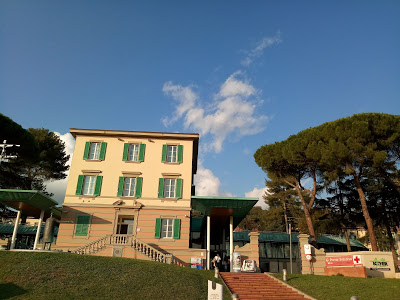 |
| L’Ospedale Meyer |
When we entered the hospital, we took a number at reception, like the rule-following Americans that we are, and waited for our number to be called. The man at the sportello (the window) said, no, no, you come see me only after you have completed your appointment. I had grabbed a small map from a literature rack in the waiting area that detailed how to arrive to the Pediatric Cardiology department in the sprawling facility. So off we started, arriving a few minutes later to a modest waiting area. There was no discernible check-in process or desk, no copy, no one asked for our ID, nothing.
As an American, this is the part that always shocks me. How in the US, when people are sick, feeling their worst, most anxious or frightened, we put them through a simultaneous paperwork hell.
But we were not in paperwork hell. I read a book. Vic watched Masha and the Bear on the TV. Jason paced. Five minutes after our appointment was meant to begin, a patient left, and I spied a desk inside. Jason popped his head in, returning to confirm that we were doing the right thing to wait.
A couple of minutes later, a smiling middle-aged Italian man in a coat opened the door and called Victor’s name. We all filed in.
Jason gave the doctor the referral from the private pediatrician, and the EKG ribbon printout. The doctor quickly reviewed them, and said, I am not worried about this, but let’s have a look.
Vic got a second EKG, very thorough. Throughout the exam, the doctor narrated what he was seeing, and said, when he saw normalcy, that all looked normal. I sat in his desk chair, and Jason was in an extra chair. I kept my eyes conscientiously away from his monitor. We all chatted amiably throughout the exam. Vic’s super Italian ensured he understood the doctor well, and followed all instructions.
After the EKG, a heart ultrasound. Vic was not a fan of the cold gel. A very, very thorough exam. The doctor must have taken 20 stills, and measured and listened and looked. After the EKG was done, I helped Vic wipe the gel off his chest and get his shirt back on.
The doctor said, “Everything is fine. He has a non-threatening that 40% of all children have, which he will grow out of by the time he is 12.”
Jason and I each heaved sighs of relief. The doctor slipped out to write our bill.
When he returned, we took the bill and went back to the reception, and, again like good Americans, took a number and waited to the the same man again. We thought we were going to pay at the sportello. But no! The health system employee looked horrified. He does not handle the money. We were directed to a large red kiosk to pay.
This jacked-up ATM is the central paypoint for the Italian NHS (national health system). We scanned Vic’s NHS card, entered some more information, saw our total, and opted to pay cash. The total cost of the visit was 115 euros. We did no intake paperwork. We did not pay a copay up front. We did not haggle about copay or coinsurance with office staff. We took the receipt from the kiosk back to the sportello man, who thanked us; the second copy we delivered to the cardiologist to show him that we had paid, and we were off, two hours later.
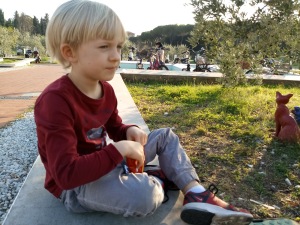 |
| Victor, post-appointment at Meyer. |
So, just as an American who has written before about the PTSD that all Americans have from what our healthcare system in the US has done to us:
- At no point were were worried about what the specialist appointment would cost us. A good friend in the US who has truly been around the inside of the US healthcare system on the east coast said, “That appointment in the US would have easily cost you $6000.” In Oklahoma, that amount would have exceeded our cash savings on hand.
- The cardiologist appointment would have cost nothing, had we been fully integrated into the Italian NHS, but we would have waited up to 6 months for it as it was not an acute condition.
- I still cannot get over the personal access that Jason and I had to the pediatric cardiologist. He was in no hurry. He was reassuring. There were no nurses in and out. No assistants. And, he was not looking information up on WebDoctorMD, or some such similar website, while he examined Victor, as used to routinely happen to me in the US.
- The pediatric cardiologist is a public doctor, but many of these doctors have incentiving arrangements where they see private patients, for example, for four hours a week, in their regular office.
- The utter lack of Italian paperwork associated with this episode was breathtaking. Jason laughed, after it was all sorted out, “the most paperwork I did for this process was for our US health insurance.”
- Although we are fuori quota for insurance, we are still able to access the superlative services of the Italian healthcare system.
- If we wanted to buy in quota, it would cost around 2000 euros.
- The kids and Jason are covered under Gonzaga’s solid health plan. Even if something catastrophic were to happen to one of us, like a ruptured appendix, the final hospital bill would still be something we could have managed to pay, because there is no gouging sliding fee scale.
And we are grateful that top-flight pediatric specialists are available to us in Firenze.



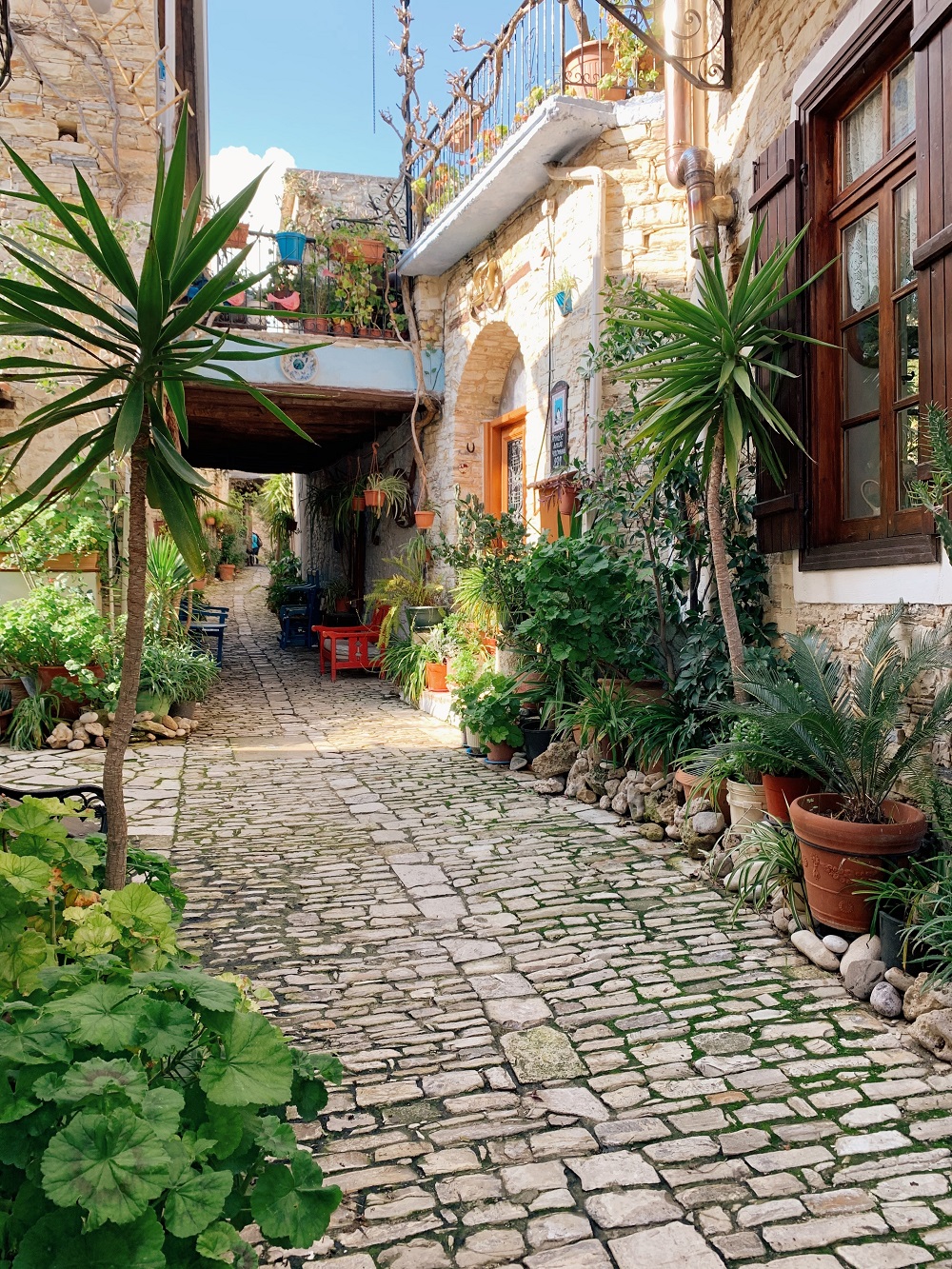
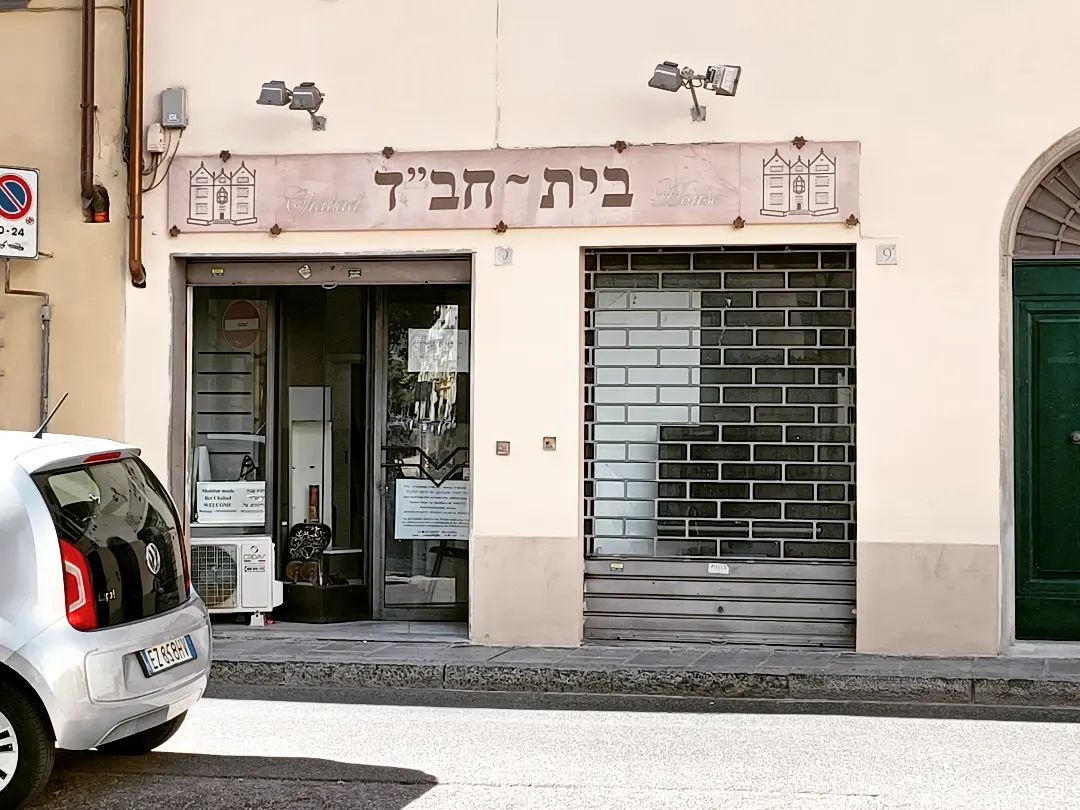
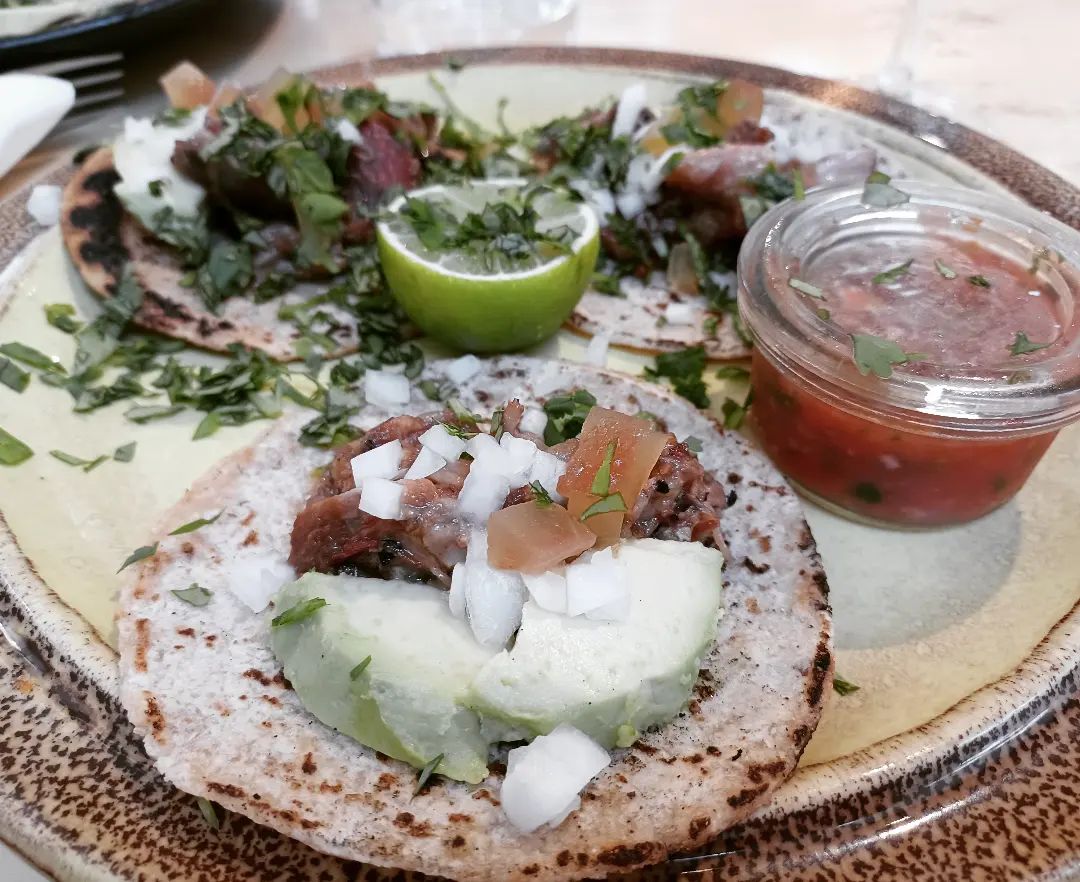
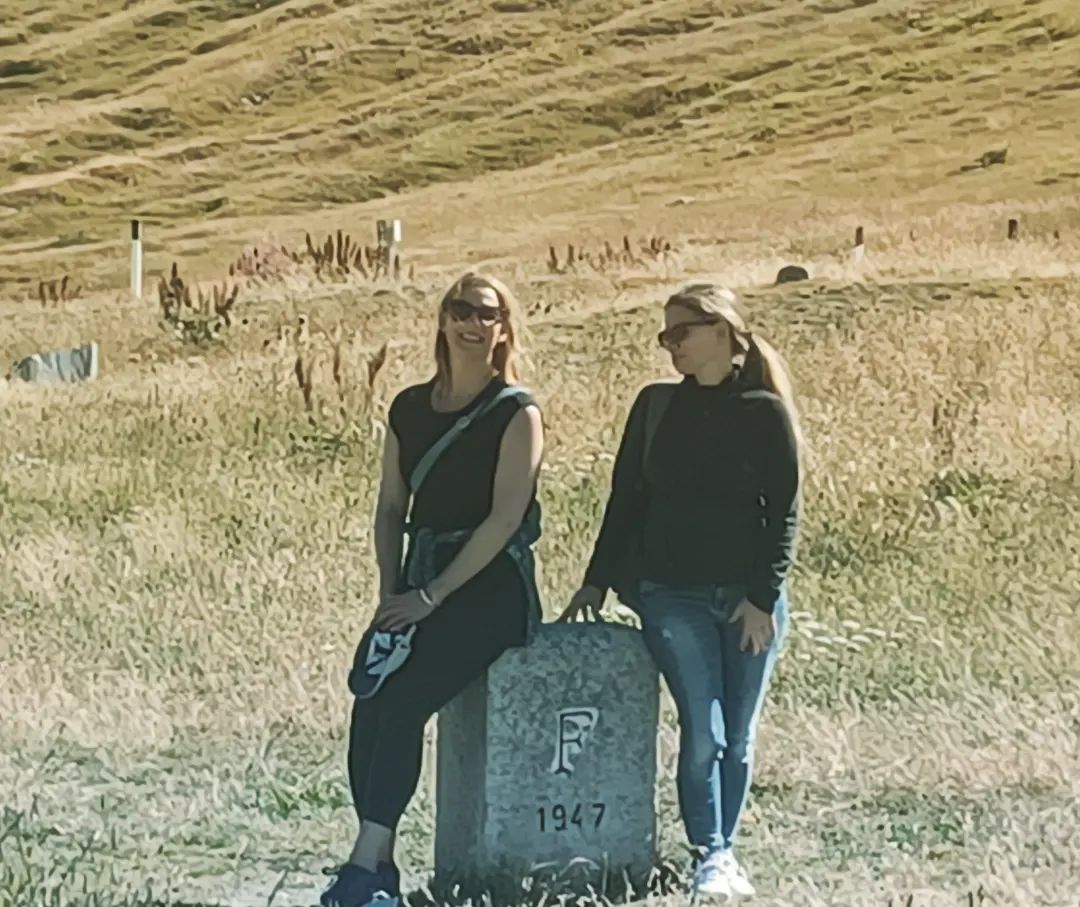
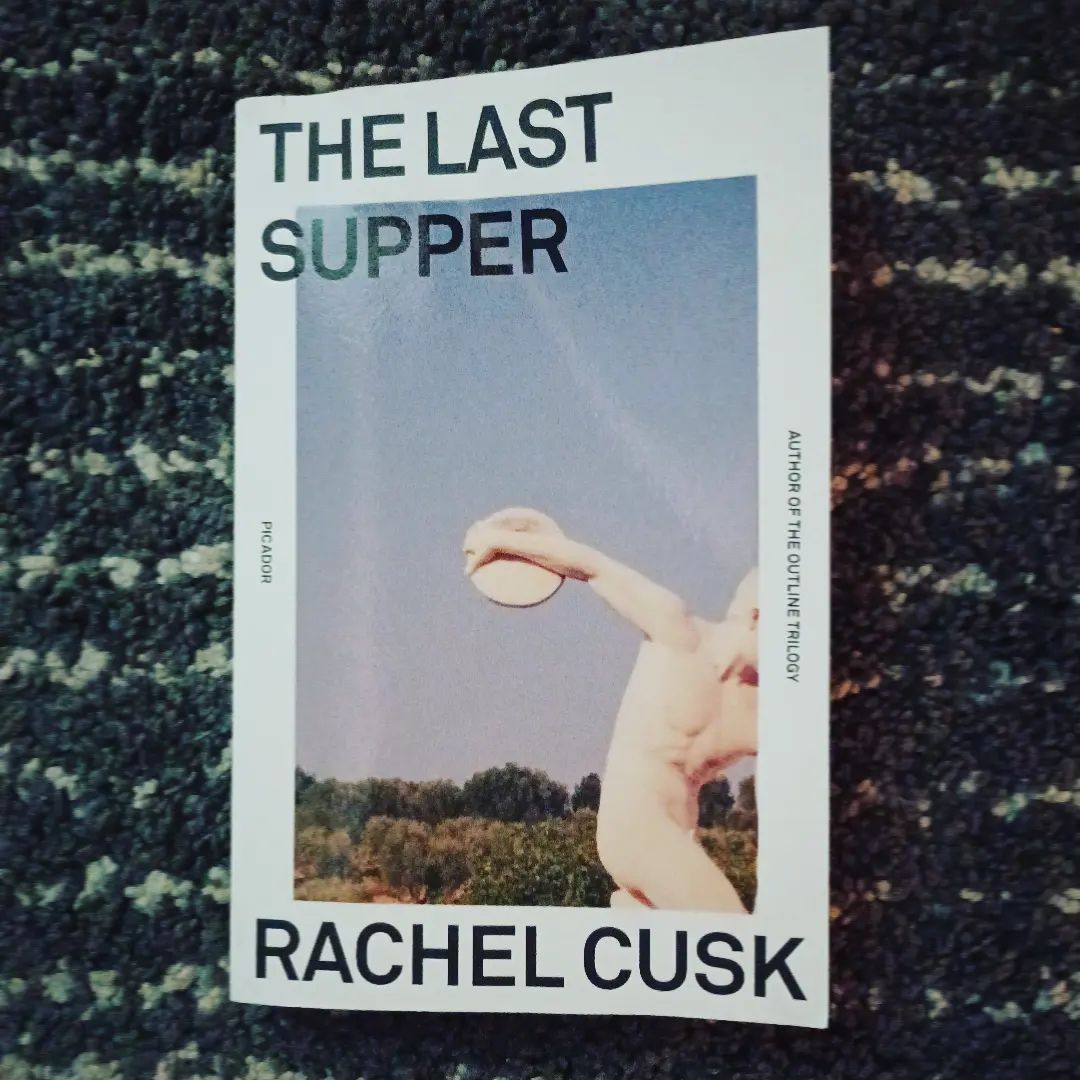
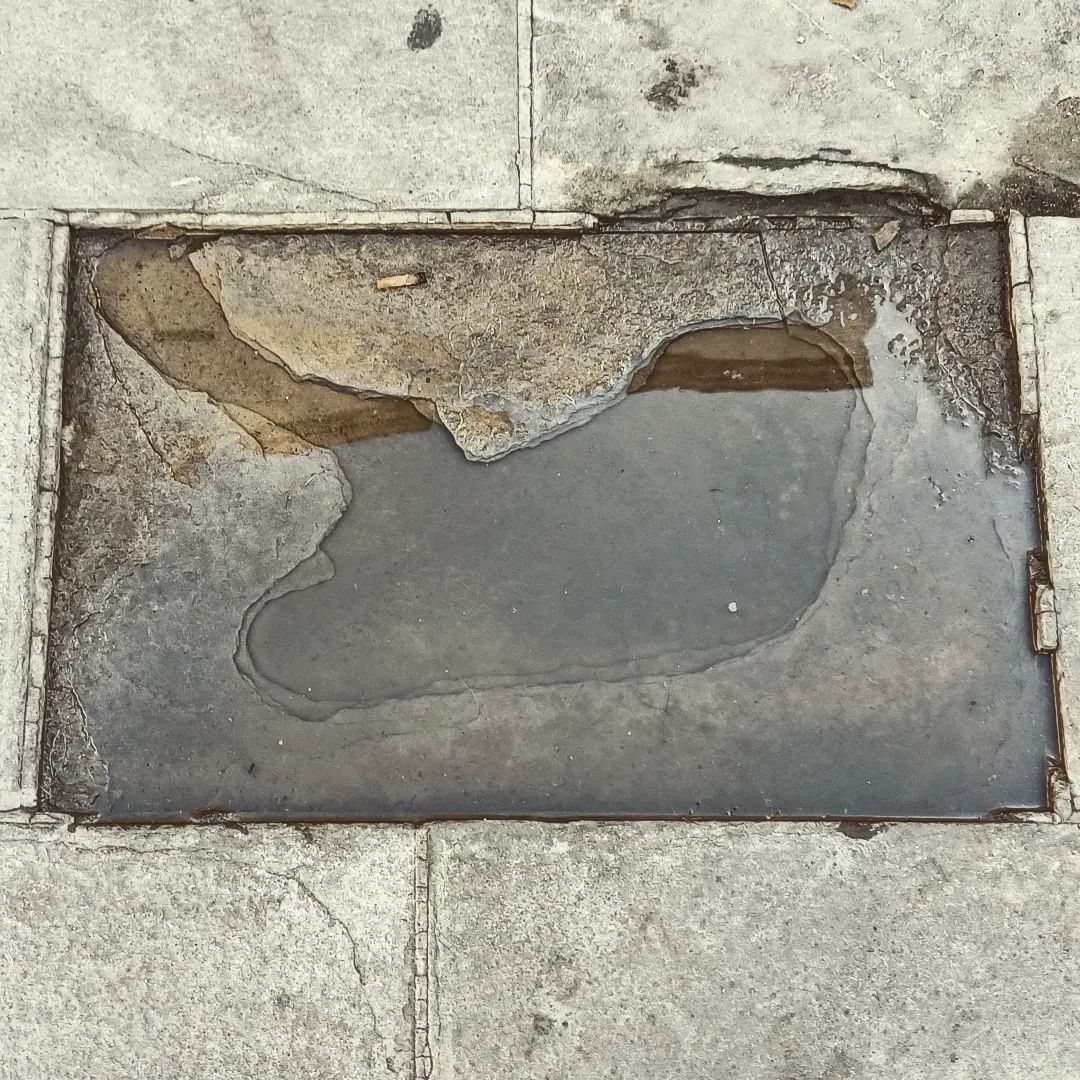
2 Responses
So glad Victor is ok!
Vielen dank – auch Uns!